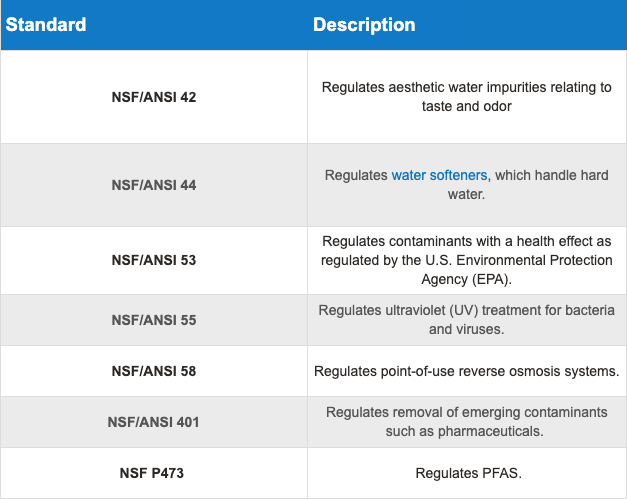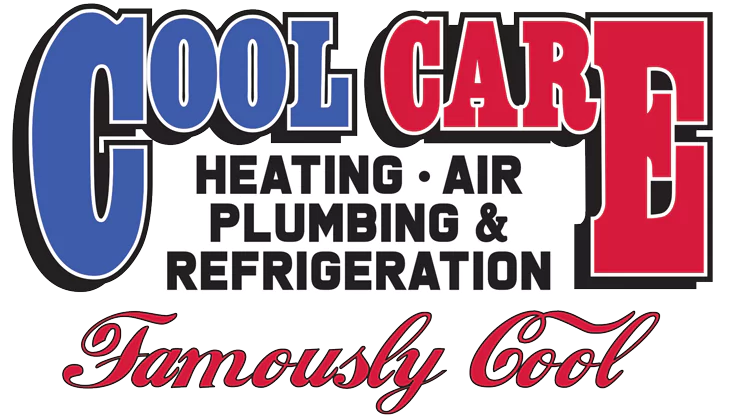Do you know what’s in your drinking water? By the time it reaches the tap, even treated municipal water can contain toxic levels of unregulated chemicals. Substances like polyfluoroalkyl substances (PFAS) or dangerous medications that people have flushed down the drain may be found in your tap water; therefore, many homeowners install water filtration and purification systems. Not all filtration and purification systems can filter out the contaminants that could cause the most damage.
What is the Best Water Filter for My Home?
There are many different types of water filtration systems on the market. Some popular, relatively inexpensive filters fit right onto your faucet. Others mount under your sink (point-of-use) or in a centralized location in your house. The only way to cut through the clutter is to look at which NSF/ANSI standards each water filtration system meets. These are national public health standards that regulate and verify the claims of filtration equipment that encounters potable water. If a water filter does not list these certifications on its packaging or in the manual, then you cannot trust it to filter out what it says it will. It is also very important to check the claims for specific contaminant reduction such as lead.
Below are common standards you may encounter:

Keeping these standards in mind when shopping for a water filtration device will help you pick the right one; however, you probably do not need to filter out everything. You should have your water tested to determine if there is anything particularly dangerous. For example, if you have high chlorine and nothing else, all you need is a filter that meets NSF/ANSI Standard 42.
Be wary of filters that make claims but have not been tested or verified as uncertified filters may only filter out large physical contaminants and little else. Also, you should consider the filter’s service life and how often it will need to be changed.
Types of Water Filtration Systems
The main types of water filtration include carbon filters and reverse osmosis.
Carbon Filters for Water
Thousands of years ago, the ancient Egyptians discovered that water stored in charcoal—carbon residue—tasted better. As a result, carbon is the world’s oldest form of water filtration and one of the most common on the market today. It is found in many pitcher or faucet-mount filters. Carbon filters work through adsorption—not to be confused with absorption. In adsorption, as water contaminants pass a piece of carbon, they stick to it, and thus, water is cleaner as it flows to your tap. A carbon filter’s effectiveness is determined by the carbon’s thickness and how long the water is exposed. The longer the water “stays” on the carbon, the more contaminants will stick to it. Carbon filters can remove organic compounds, such as pesticides, herbicides, chlorine, volatile organic compounds (VOCs), and certain heavy metals. Some even claim to capture bacteria, although there are better solutions for that, like UV. Carbon does not remove minerals like calcium or magnesium. As always, remember to check NSF/ANSI ratings when evaluating a carbon filter for effectiveness.
There are two types of carbon filters:
- Granular Activated Carbon
- Carbon is ground up.
- Carbon Block Filters
- These contain a solid block of carbon and are more effective because the carbon is resistant to water channeling and has a wider surface area.
Reverse Osmosis
Osmosis is the tendency of a solution with less concentration to move toward one with more concentration. For example, water with less salt will naturally want to move toward the water with more salt.
In this same example, reverse osmosis would use a pump to force the water with more salt toward the water with less salt. A reverse osmosis water filter forces water with contaminants across a semi-permeable membrane (think of a sand sifter). The contaminants stay behind while the clean water flows through to the tap.
Many reverse osmosis filters are two- or three-stage filters because they run the water through two to three filters including a carbon filter and installed under your sink. You are getting multiple stages and types of filtrations for maximum effectiveness. Reverse osmosis will remove lead, fluoride, chromium, mercury, asbestos, pesticides, chlorine, and pharmaceuticals. It removes so many contaminants that some experts think it is overkill. Drinking water with such low mineral content can strip necessary minerals from your body.
Bacteria and viruses are among the few contaminants that reverse osmosis does not remove effectively; however, some reverse osmosis systems include a UV component to kill even these organisms.

Water Purification
While the water filtration methods mentioned so far are true filters, UV light is considered a water purifier because it inactivates contaminants rather than removes them. UV light kills harmful viruses, bacteria, and protozoa like Giardia, Cryptosporidium, and E. coli. Although the dead microbes remain suspended in the water, they are rendered harmless. UV purifiers cannot kill something that is not alive, so they do not work on chemical contaminants. Also, their effectiveness depends on how clear the water is and how long the contaminants are exposed (longer is better).
If you are on well water and have identified harmful microbes in your water, UV purification combined with carbon or reverse osmosis filtration is the way to go. On the other hand, most city water has been treated with chlorine—a highly effective disinfectant—so microbes are not typically a concern.
Which Water Filter is Right for Me?
To reiterate, the type of filter or purifier you buy will depend on what is in your water. Below is a chart that summarizes which filters work for which common contaminants.

This chart is meant to be a general guide since not all filters are equally effective. Some may not be rated to remove specific contaminants listed here especially if they don’t meet NSF/ANSI standards.
As you can see, in some instances, it might be beneficial to have two different types of filters or purifier especially if bacteria and viruses are a problem.
Cool Care’s expert plumbers offer many options for water filtration and treatment for your home or business. Just give us a call at 803.772.7715 to discuss options today!


